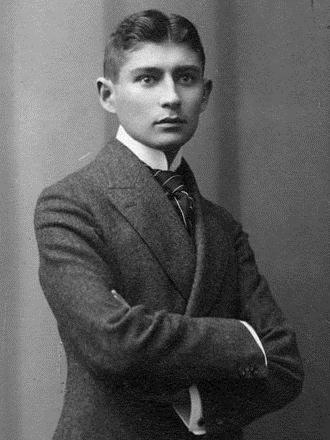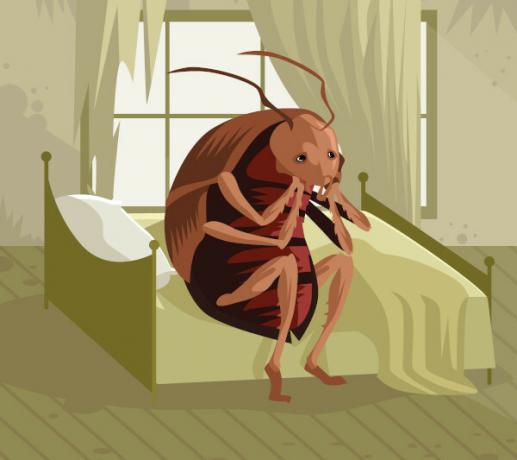Franz Kafka, Czech writer, was born on July 3, 1883. He was Jewish and had a conflicting relationship with his father, an oppressive figure who was indirectly present in the writer's narratives. Graduated in Law, he worked for 14 years at the Institute of Work Accident Insurance, but had his early retirement in 1922 due to tuberculosis. Thus, he could not devote himself exclusively to writing.
At writer's works possessexpressionist traits and are embraced by the mmodernism. Therefore, it is possible to verify, in their narratives, the reality deformation, the presence of allegories, the unconventionalism, the nonsense and pessimism. His main books are the metamorphosis, The process and The castle. His best friend, Max Brod, was largely responsible for publicizing the works of the author, who died on June 3, 1924.
Read too: José Saramago – Portuguese author winner of the Nobel Prize and Camões Prize
Biography of Franz Kafka
Franz Kafka was born on July 3, 1883, in Prague. He had a lonely childhood, as his parents spent the entire day in the Kafka shop, and the boy was taken care of by a governess, a cook and a maid. His mother was submissive, and his father was an authoritarian businessman who did not support his son's penchant for literature and had great influence on the writer's work — the
conflict with the father, an oppressor, was reflected in some of his narratives.Since the beginning of his life, the writer had contact with Czechs and Germans, so he mastered both languages. So Hermann Kafka (1852-1931) enrolled his son in the German School for Boys, which was close to his home. The writer studied at this institution from 1889 to 1893, being approved with distinction. From 1893 to 1901, Kafka attended the German Secondary School. in her he had a humanist background and completed the first three years with distinction. Then, his income declined, even starting to show difficulty in mathematics.
Between 1901 and 1906 he studied at the German University in Prague. He chose to study Chemistry, but transferred to Law two weeks later. During the course, he also sought to study philosophy and art history. Due to the strong antisemitic persecution, Kafka, as a Jew, had some difficulty in entering public service. So liberal professions, such as doctor and lawyer, were the best option. He received his law degree on June 18, 1906.

He worked at Assicurazioni Generali Insurance Company, for a brief period, from October 1, 1907 to July 31, 1908, and for 14 years, from August 30, 1908 to July 1, 1922, he worked at the Worker's Compensation Insurance Institute, which, partially state-owned, employed very few Jews. Ali Kafka had a successful career with promotions. However, he received early retirement due to his health problems. Kafka, like so many writers, could not devote himself exclusively to literature, which caused him great anguish.
In 1902, the writer met Max Brod (1884-1968). This was his best friend and, therefore, he was the main source for the later construction of his biography, in addition to being the main responsible for the dissemination of his work. So he ignored his friend's last wish, who, in a will, asked him to destroy his unpublished works. Max Brod did the opposite and, after Kafka's death, began to publish his texts.
Do not stop now... There's more after the advertising ;)
Kafka, always in the company of Max Brod, a great friend of his, traveled on vacation to Riva (Italy) in September 1909; to Paris in October 1910; made an excursion from Lugano to Paris, via Milan, in late August and early September 1911; and traveled to Weimar, late June and early July 1912.
Your love life was somewhat troubled. Felice Bauer (1887-1960) was his first bride and lived in Berlin. From 1912 to 1917, he sent more than 500 letters and postcards to her, but they rarely met in that time. In 1919, he met Julie Wohryzek (1891-1944), his second bride, but Kafka's father opposed the marriage due to social differences.
The writer spent two vacations, 1905 and 1906, in Zuckmantl, to take care of his physical weakness and exhaustion. On his first stay at this spa, favored by Jews because of its non-discrimination, from August 3rd to 27th, 1905, he had his first sexual experience, with one of the guests there. As early as 1906, he remained there from 23 July to 29 August.
Became a vegetarian shortly before 1910 and opted for natural and unconventional therapies, in sanatoriums such as Jungborn, Germany, in 1912. Most of his life, Kafka lived with his parents in the historic center of Prague — the Old Town. He later moved in with one of his sisters. She was never able to have a home of her own, but had some temporary residences between 1914 and 1917.
After being diagnosed with tuberculosis, he tried to recover in Siřem, 1917; in Želizy, of 1918 to 1919, where he met his second bride Julie Wohryzek; in Merano, Northern Italy, from April to June 1920; in Matliary, 1921; in Planá, 1922, where he intended to continue writing The castle, but there was a nervous breakdown; and in Berlin, 1923, where he went to live with Dora Diamant (1903-1952), in a precarious financial situation.
Yet, Max Brod took Kafka back to Prague in March 1924. In April, the writer checked himself into the Wienerwald sanatorium in Austria; at Prof. Hajek in Vienna; and at Dr. Hoffmann's sanatorium at Kierling, where he lived the last six weeks of his life. Died on June 3, 1924.
Literary style by Franz Kafka
The works of Franz Kafka have the marks of the andxpressionism and are commonly associated by critics with the modernism. Basically, they have the following characteristics:
- reality warping
- fantastic realism
- Absence of idealizations
- Presence of allegories
- subversive character
- Unconventionalism
- fragmentation
- stream of consciousness
- existential anguish
- anti-traditionalism
- Atmosphere of oppression
- nonsense
- irrationalism
- Pessimism
Read too: Modernism in Brazil - literary movement divided into three phases
Works by Franz Kafka
![Cover of the book A metamorfose, by Franz Kafka, published by Companhia das Letras. [1]](/f/c9bb1d5be5e0f76bb67641f1d689b963.jpg)
- Description of a fight (1912)
- Contemplation (1912)
- the stoker (1913)
- the metamorphosis (1915)
- a rural doctor (1918)
- in the penal colony (1919)
- an artist of hunger (1922)
- The process (1925)
- The castle (1926)
- the missing or Amerika (1927)
- Daily (1948)
- letter to father (1952)
- Letters to Milena (1952)
- Letters to Felice (1967)
the metamorphosis
Kafka's three critically acclaimed books are the metamorphosis, The process and The castle. The first, that is, the metamorphosis, is his best known work worldwide. In this book, the protagonist Gregor Samsa wakes up transformed into a kind of insect, which causes the reader to feeling of strangeness in front of the nonsense, since, at no time, there is an explanation for the character's metamorphosis:
“One morning, awakening from uneasy dreams, Gregor Samsa found himself in his bed metamorphosed into a monstrous insect. He was lying on his back, hard as a breastplate, and when he lifted his head a little, he saw his bulging belly, brown, divided into arched segments, over which the cover, about to slide for good, only remained with difficulty. Her many legs, pitifully thin compared to the bulk of the rest of her body, fluttered helplessly before her eyes.”|1|
fact is that this transformation takes Gregor Samsa out of sameness, from its repetitive daily life. However, at first, it is surprising that he doesn't despair in the face of such an unusual situation, accepts the transformation as something inevitable, despite doubting, at a certain moment, that reality, that allows him to see his family from another angle, as he is now a stranger to Is it over there.
The metamorphosis, at first, is seen by the protagonist only as an unforeseen event that makes him leave the traveling salesman routine. In fact, in front of her, he worries much more about his absence from work than about this unusual drama. The work, therefore, makes a criticism of the world capitalist, in which the human being is valued only when he is productive, being no more than a utilitarian being.
However, by metamorphosing, Gregor Samsa ceases to be a productive individual and becomes an unsolved problem. No longer being productive, the protagonist becomes something uncomfortable and disposable. Before, he kept the family and, because of that, he was a prominent figure there. With the change, he loses this kind of economic power, as a cockroach is unimportant in the capitalist world of work. Thus, Gregor Samsa loses his social role:
“Sometimes I thought of, as soon as the door opened again, to take the family's affairs back in hand, just as I did in the past; in his thoughts, after a long time, the boss and the manager reappeared, he came back to remember the clerks and apprentices, the stupid usher, two or three friends from other firms, [...]. Soon after, he returned to not having the slightest disposition to worry about his family, he just felt hatred for the mistreatment to which he was subjected [...].”
In this work, the manager, his superior, is the figure of the oppressor to whom everyone owes subservience. The whole situation is also oppressive, since the clerk he is forced to keep himself confined so as not to disturb nobody, while his family creates a new dynamic, in which he is relegated to invisibility. His sister takes the lead, becomes useful, as does his father, who returns to the world of work.

On the other hand, metamorphosis figures as a liberation from this world of oppressive routines, the job Gregor Samsa wanted to get rid of. The insect is possibly the metaphor the marginal, the artist, the one who escapes imposed social rules and, therefore, is rejected. This not belonging to the social gear causes a inner change in protagonist.
See too: Fantastic Tale – a literary genre much explored by Kafka
Quotes by Franz Kafka
Below, we highlight some sentences of the author, taken from the book letter to father, translation of Modesto Carone:
"What is alive does not allow for calculation."
"Not every child has the stamina and fearlessness to keep looking until they reach kindness."
"I could only be grateful like a beggar, never through action."
"It's not easy to find a compromise."
"Neither was I free nor, at best, I was not yet."
"I studied little and learned nothing."
"I was so deeply preoccupied with the spiritual affirmation of my existence that everything else was indifferent to me."
“I am convinced that getting married, founding a family, welcoming all the children who come,
keeping them in this insecure world and guiding them a little, is the most a man can generally achieve.”
"At hand I have nothing, all the birds are flying and yet I need to choose nothing."
“Life is more than a game of solitaire.”
Note
|1| Translated by Marcelo Backes.
Image credit
[1] Company of Letters (Reproduction)
by Warley Souza
Literature teacher
